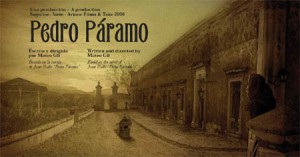Today we’re sharing some of the research of our Exódo summer multi-arts collective! Vassar student Ariana Sacristan-Benjet offers an overview of magical realist fiction and its relationship to Day of the Dead.
“Magical Realism” is a literary genre common in Latin American writers. As I looked at some novels and stories under this genre I realized that death was explored in a similar way to how it is explored in Day of the Dead. Death is presented as a cyclical phenomena, in which fluidity exists between life and death. Also, death accompanies life and therefore lacks the tabu that is given to it in other cultures. Ghosts and spirits invade the world of magical realism and speak to the immortality of people through memories. Here are the texts I looked at:
Pedro Páramo by Juan Rulfo
“There was no air; only the dead, still night fired by the dog days of August. Not a breath. I had to suck in the same air I exhaled, cupping it in my hands before it escaped. I felt it, in and out, less each time…until it was so thin it slipped through my fingers forever. I mean, forever.”
“Cada suspiro es como un sorbo de vida del que uno se deshace.”
100 Years of Solitude by Gabriel García Márquez
“He really had been through death, but he had returned because he could not bear the solitude.”
“Death really did not matter to him but life did, and therefore the sensation he felt when they gave their decision was not a feeling of fear but of nostalgia.”
Aura by Carlos Fuentes
“No volverás a mirar tu reloj, ese objeto inservible que mide falsamente el tiempo acordado a la vanidad humana, esas manecillas que marcan tediosamente las largas horas inventadas para engañar el verdadero tiempo, el tiempo que corre con la velocidad insultante, mortal, que ningún reloj puede medir. Una vida, un siglo, cincuenta años: ya no te será posible imaginar esas medidas mentirosas, ya no te será posible tomar entre las manos ese polvo sin cuerpo.”
“Originality’ is the sickness of modernity that wishes to see itself as something new, always new, in order continually to witness its own birth. In doing so, modernity is that fashionable illusion which only speaks to death”



